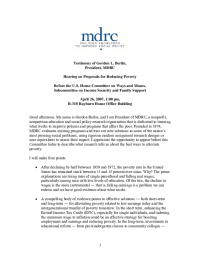Congressional Testimony by Gordon Berlin on Solutions to Poverty
Presented before the U.S. House Committee on Ways and Means, Subcommittee on Income Security and Family Support, on April 26, 2007.
Good afternoon. My name is Gordon Berlin, and I am President of MDRC, a nonprofit, nonpartisan education and social policy research organization that is dedicated to learning what works to improve policies and programs that affect the poor. Founded in 1974, MDRC evaluates existing programs and tries out new solutions to some of the nation’s most pressing social problems, using rigorous random assignment research designs or near equivalents to assess their impact. I appreciate the opportunity to appear before this Committee today to describe what research tells us about the best ways to alleviate poverty.
I will make four points:
- After declining by half between 1959 and 1972, the poverty rate in the United States has remained stuck between 11 and 15 percent ever since. Why? The prime explanations are rising rates of single parenthood and falling real wages, particularly among men with low levels of education. Of the two, the decline in wages is the more instrumental — that is, falling earnings is a problem we can redress and we have good evidence about what works.
- A compelling body of evidence points to effective solutions — both short term and long term — for alleviating poverty related to low earnings today and the intergenerational transfer of poverty tomorrow. In the short term, enhancing the Earned Income Tax Credit (EITC), especially for single individuals, and indexing the minimum wage to inflation could be an effective strategy for boosting employment and earnings and reducing poverty. In the long term, investments in educational reform — from pre-kindergarten classes to community colleges — should equip the next generation with the skills they need to obtain high-paying jobs.
- These short- and long-term two-generation strategies are interdependent: Providing enhanced work supports to adults to move families out of poverty today has positive effects on young children’s school performance — and provides a strong foundation for long-term efforts to prevent poverty tomorrow through improved educational opportunities for poor children.
- An aggressive strategy to address falling wages would redesign and expand the EITC benefit for individuals, regardless of their parenting or marital status, conditioned on working 30 hours a week and determined on the basis of individual income rather than joint income. Retaining the current EITC for families with children while creating a new EITC for single individuals (including noncustodial parents and second earners in two-parent households) could have wide-ranging positive effects on employment, earnings, income, and poverty — as well as on family well-being. But because the costs of such an initiative would be high, a prudent first step would be a demonstration project with a rigorous research design in three or four cities to determine if the plan’s benefits outweigh its costs.






